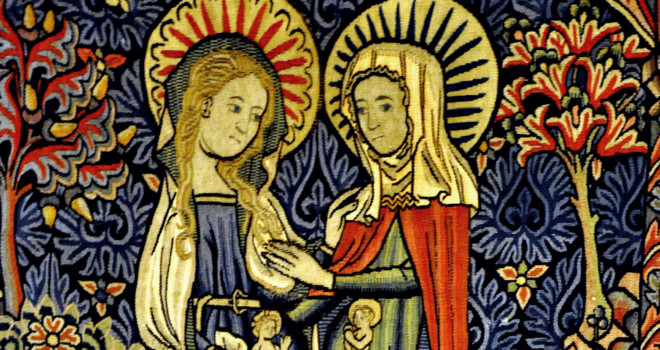 The days following the angel’s announcement had been the most exciting, most disorienting days of Mary’s life. With only one fresh water spring, the village of Nazareth was small. Rumors flew. By all appearances, she had fallen into disgrace. She was avoided, even slandered by her own kindred, homeless in her own hometown. The silence between her and Joseph was a yawning chasm. Yet even as whispers turned into open slander among the townsfolk, Mary’s heart beat with purpose. She remembered God’s promises. And she remembered her promise, I am the Lord’s handmaiden.
The days following the angel’s announcement had been the most exciting, most disorienting days of Mary’s life. With only one fresh water spring, the village of Nazareth was small. Rumors flew. By all appearances, she had fallen into disgrace. She was avoided, even slandered by her own kindred, homeless in her own hometown. The silence between her and Joseph was a yawning chasm. Yet even as whispers turned into open slander among the townsfolk, Mary’s heart beat with purpose. She remembered God’s promises. And she remembered her promise, I am the Lord’s handmaiden.
But still, she needed space to process all that was happening, needed to get away from the gossip and judging eyes. So she packed her things and went to visit her cousins Elizabeth and Zechariah in the hill country of Judea. She yearned to abandon herself to the road, like God’s vagabond Abraham. Elizabeth was also pregnant and already in her sixth month, and her husband had been visited by the same angel. Maybe Elizabeth would understand?
The journey had been long and mountainous, every step an inward peregrination, a setting-out-not-knowing-where. Upon her arrival, when her cousin heard her greeting, she said it felt like there were trout inside her, leaping and splashing, and she cried out in joy: “Blessed are you among women, and blessed is the fruit of your womb! Tell me, why is this granted to me, that the mother of my Lord should come to me?”
Taken aback by Elizabeth’s exuberance, and not knowing what to say, Mary just shook her head and smiled. Oh! To see Elizabeth, to find a solitary friend who could understand. Mary’s heart was showered in joy. God had been faithful to his covenant with Israel. He had not forgotten them, was becoming one with them, one of them. So many passages of Scripture flooded her heart at once. Full of grace and full of God, she began to sing:
My soul proclaims the greatness of the Lord,
And my spirit rejoices in God my Savior,
For he has regarded the lowliness of his handmaiden.
For behold, from henceforth all generations will call me blessed;
For he who is mighty has done great things for me,
And holy is his name…
Mary stayed with Elizabeth and Zechariah for three months. Two pregnant women and a husband who could not speak. It was a perfect retreat. Swapping bits of maternal wisdom while they accomplished the household tasks, praying, long walks—who doesn’t love to revisit the story of the Visitation? But there is more to this story than meets the eye. What is it?
* * *
Grab a crayon or pencil and turn back to Luke 1:39-45. What might you write in the margins of this amazing passage? On the surface, it’s just a joyful encounter of two expectant mothers. But beneath the surface, Luke is stirring up Old Testament stories about the ark of the covenant—except now, he’s telling the New Testament story of the ark of the new covenant. God with us, Emmanuel. The Son of God now a Son of Adam, born of a daughter of Eve. This is worth scribbling into the margins of your Bible.
The more we look at Luke’s story of Mary visiting Elizabeth, the more we can appreciate the care and attention to detail with which he tells us the story. Luke shared a common Jewish lexicon: thousands of biblical words and idioms, popular terminology from liturgical rites. So when Luke wants to tell us that Mary is the ark of the new covenant, he draws on the common religious imagery of his time to do it—particularly, 2 Samuel 6, and 1 and 2 Chronicles.
A Shout Out to 2 Samuel
First, Luke strings together parallels between Mary’s visit to Elizabeth and David’s effort to bring the ark of the covenant to Jerusalem, in 2 Samuel 6. In a nutshell, here’s the story. The Philistines had taken the ark, and God’s presence with it. But when they finally return it, six key things happen:
-
King David goes out to the hill country of Judea to retrieve the ark that the Philistines had sent back to Israel (6:3).
-
After Uzzah touches the ark and is struck dead, David fearfully wonders, “How can the ark of the Lord come to me?” (6:8-9)
-
David then leaves the ark in the hill country of Judea for three months (6:11).
-
The house that had housed the ark in this interim is blessed (6:10).
-
David (wearing the priestly linen ephod) dances and leaps before the ark and everyone shouted for joy before the ark (6:14, 16).
-
The ark is eventually brought to Jerusalem, where God’s glory is revealed in the temple (2 Samuel 6:12; 1 Kings 8:9-11).
How, exactly, is this story like the time Mary visited Elizabeth? To help us see it, we need to turn back and look at six parallel details from Luke 1:39-45:
-
Mary goes to the hill country of Judea (1:39).
-
Elizabeth cries “Why is this granted me, that the mother of my Lord should come to me?” (1:43)
-
Mary stays with Elizabeth for three months (1:56).
-
Elizabeth proclaims Mary to be blessed (1:42).
-
John the Baptist, who was from the priestly line of Aaron, leaps for joy in Elizabeth’s womb upon Mary’s arrival (1:40, 44).
-
Mary eventually presents Jesus in the Jerusalem temple (2:21-22).







